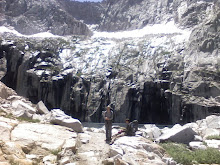He once was a fisherman, himself, and enjoyed the tug of both oar and net, unafraid of long work and hot days pulling and putting nets, sorting and selling his catch, repairing his gear by night so that he might enjoy a new day the next morning. When the storms came, and they always do, he would pull up his boat with the tide and repair what was needed after the danger was past. It was a rhythm; it was life's own tidal sway.
When the big storm destroyed his last boat, he decided to help a friend mend his nets instead of rebuilding his own bark. He discovered that-- in enabling another to more quickly return to the harvest, he could benefit from the catch and start a new vocation. And so he did. Fishermen would trade catch and currency for the mender to ply his trade, quickening their returns while enhancing his own commerce and connection throughout the village and beyond. When the fishing was fallow, he would weave for pottery and things terrestrial... everyone used net, and for a mite he would lend his leathery, dexterous hands.
As time turned into age, and age turned into thought, the years produced a change that the mender had not considered: What if he was no longer needed? What if his simple life became simply unsustainable? The elders of the village turned from lore into loam, and the youth of the village had little taste for the ways of old. The fish were playing out, so the village was fading into the farmlands to dig a new life from a different kind of sea. And the laughter of children faded. And his stiffened hands-- what were they to do? What was the purpose for an older net-mender?
 |
| credit: https://www.ourstate.com/does-the-sun-set-over-east-coast-beaches/ |

No comments:
Post a Comment